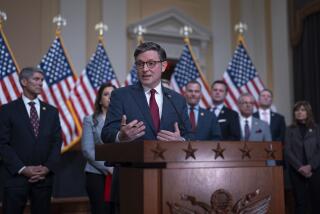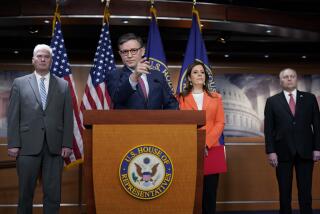The House : Gambling Ads
- Share via
By a vote of 259 for and 159 against, the House failed to achieve the two-thirds majority it needed to pass a bill (HR 3146) permitting advertising by legal gambling operations other than state lotteries. While federal law permits government lotteries to advertise by mail and broadcast, it bans similar advertising of gambling that is privately conducted, such as by casinos and churches. The bill sought to eliminate that inconsistency.
The bill was debated under a short-cut parliamentary procedure that required more than a simple majority for passage.
Sponsor Barney Frank (D-Mass.) complained that “public gambling is given a 100% monopoly in advertising” via the airwaves and mail.
Opponent Frank Wolf (R-Va.) told colleagues that the bill would “allow the casinos in Las Vegas and Atlantic City to advertise on radio and television in your congressional districts, perhaps taking away tourism from your area.”
Members voting yes supported the bill.
How They Voted Yea Nay No vote Rep. Anderson (D) x Rep. Dornan (R) x Rep. Dymally (D) x Rep. Lungren (R) x
Defense Bill
By a vote of 252 to 172, the House approved a fiscal 1989 defense budget of $299.5 billion. The bill (HR 4264) was headed for conference with the Senate version of the Pentagon budget for the year beginning in October.
While the Democratic-drafted bill complied with a spending ceiling set previously by Congress and the Administration, it clashed with many of the Administration’s weapons development and arms control policies and drew widespread Republican opposition.
Members voting yes supported the defense authorization bill.
How They Voted Yea Nay No vote Rep. Anderson (D) x Rep. Dornan (R) x Rep. Dymally (D) x Rep. Lungren (R) x
Low-Trajectory Missiles
By a vote of 262 to 160, the House adopted an amendment to the 1989 defense bill (above) to ban testing of “depressed-trajectory” ballistic missiles if the Soviets do the same. These missiles are seen as first-strike weapons because their rapid advance on target would leave no time for effective retaliation.
Amendment supporters noted that fear of retaliation is a major deterrent to nuclear war.
Supporter Robert Dornan (R-Calif.) said the proposed mutually verifiable testing ban would “slam the door on the Soviet Union” since the United States has no need for a first-strike missile.
Opponent Duncan Hunter (R-Calif.) said House members did not have enough scientific evidence on whether such a testing ban by the Soviets could be verified.
Members voting yes favored the amendment.
How They Voted Yea Nay No vote Rep. Anderson (D) x Rep. Dornan (R) x Rep. Dymally (D) x Rep. Lungren (R) x
More to Read
Get the L.A. Times Politics newsletter
Deeply reported insights into legislation, politics and policy from Sacramento, Washington and beyond. In your inbox twice per week.
You may occasionally receive promotional content from the Los Angeles Times.










